TheRoundup is reader supported. We may earn a small commission when you make a purchase via links on this site, at no cost to you.
All products are personally reviewed and tested in accordance with our Review Methodology.

Are you worried about toxic chemicals in your bakeware leaching into your apple pie or meat loaf?
You're right to be concerned. Because many traditional bakeware options contain harmful chemicals such as PTFE (Teflon), BPA, lead, and cadmium.
I've been baking with my daughters on weekends for many years, and we only use the safest non-toxic bakeware brands in our kitchen.
Together, we've tested a vast range of baking sheets, pans, dishes, and tins from brands like 360 Cookware and Pyrex.
This list reveals the healthy bakeware options that offer the non-stick performance we need, without the harmful chemicals.

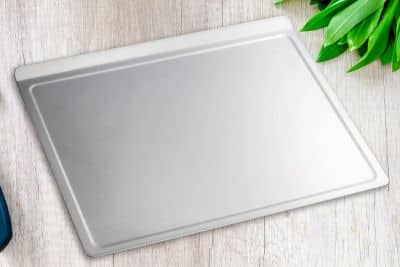
Why It's My #1 Pick: 360 Cookware's bakeware's construction quality is incredible. It was unmatched by any other stainless steel brand I tested.
The brand's eco-friendly practices also beat most other brands I tested.
Personal Experience: The first thing that struck me about the 360 Cookware Large Cookie Sheet was its robust construction. I also appreciated the generous size. It meant I could make large batches of cookies or appetizers for parties in just one go.
This non-toxic baking sheet features a multi-layer design,. It has an inner layer of aluminum, which provides an even heat distribution. This meant every cookie, from the center to the edges, was perfectly baked (golden brown and deliciously chewy).
Cleaning the cookie sheet was also a breeze. Even sticky cookie dough residue washed off easily with warm, soapy water and a sponge.
About the Brand: Based in West Bend, Wisconsin, 360 Cookware is an American company known for high-quality, durable products.
360 Cookware offers a lifetime warranty on all its products. This ensures you will never have to worry about your cookware or bakeware failing. This means less waste ending up in landfills.

✔ Space-Saving Nesting Design
✔ Easy to Clean
✔ Multiple Color Options
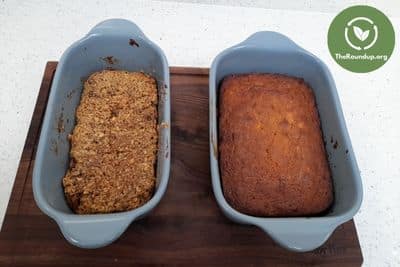
Why It's the Best Bakeware Set: The Ultimate Bakeware Set by Our Place is the most complete package I tested.
The multi-use functionality of this set meant I needed fewer items during my baking test. This helped reduce kitchen clutter.
Personal Experience: The first thing that struck me during testing was the quality of the materials. The stoneware baking dishes felt substantial and well-crafted. The stainless steel oven rack was sturdy and reliable.
I love the versatility of the large and mini griddle pans. I used them for everything from roasting vegetables to making pancakes and bacon for breakfast.
One of my favorite aspects of this set is the non-stick surfaces. The ceramic glaze on the baking dishes and the silicone oven mats make cleanup easy. I had no issues with food sticking, even when baking my gooey banana loaf and banana flapjacks.
About the Brand: I love Our Place's products and business ethics. Check out my in-depth thoughts on the brand in my Our Place Review article.

✔ Superior Heat Retention
✔ Durable Heirloom Quality
✔ Made in the USA
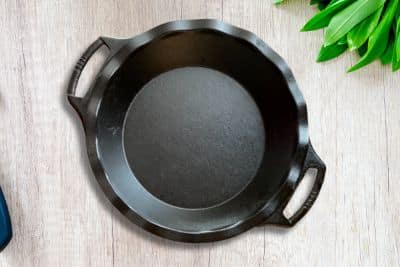
Why It's the Best Cast Iron Bakeware: Lodge Cast Iron stood out for its quality, performance, and value. It outperformed all the other cast iron bakeware we've ever used.
Personal Experience: When testing the Lodge pie pan, I was impressed by its reassuring weight and solid construction. It's clear that this pan is built to last.
The first dish I made was a classic apple pie, and the results were outstanding. The crust was perfectly golden and crispy, while the filling was evenly cooked, thanks to the pan's excellent heat retention.
I also appreciated that the pan came pre-seasoned. It was ready to use right out of the box (after a quick rinse).
Cleaning this pan in warm, soapy water was easy enough. However, I needed to take extra care to ensure that I dried and stored it properly to prevent rusting.
One feature that stood out to me was the dual-handle design. It made lifting the pan in and out of the oven easy, even when filled with a heavy pie.
About the Brand: Lodge is an iconic name in cast iron cookware and bakeware.
The company has two foundries in South Pittsburg. It's been crafting heirloom-quality products there for over 125 years.
Lodge is also committed to sustainability. They have extensive recycling programs, reuse foundry sand, and use biodegradable packaging materials.

✔ Made in the USA
✔ Easy Monitoring of Baking
✔ Easy-To-Carry Handles
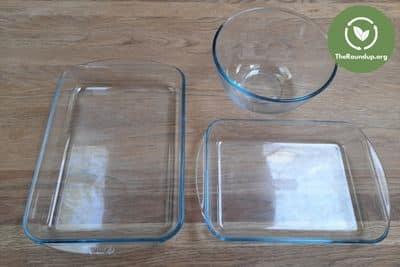
Why It's the Best Glass Bakeware: Pyrex uses a tempered soda-lime glass that's free from harmful chemicals. Also, if the glass breaks, it shatters into dull pieces rather than sharp shards, reducing the risk of injury.
Personal Experience: I've owned Pyrex rectangular baking dishes for years. I love that the clear, non-toxic glass allows me a better view of the food. This is especially useful when making lasagne as it helps ensure that every layer is cooked evenly.
The handles on Pyrex dishes make them incredibly user-friendly. I find my dishes are simple to move around, even when hot and full.
Cleaning Pyrex is also super easy. The glass doesn't stain or retain odors. A quick rinse and a trip through the dishwasher get them sparkling clean every time!
About the Brand: Pyrex has been a trusted name in kitchenware since 1915. They originally used borosilicate glass, setting a new standard for durable, heat-resistant bakeware.
In the 1990s, Pyrex switched some production to tempered soda-lime glass. Despite this change, Pyrex continues to be known for high-quality, reliable products.
A quick tip to help you determine what your Pyrex glass is made from is the capitalization of the brand name. If it's all capitals (PYREX), it's made in France from borosilicate glass. If it's all lowercase (pyrex), it's made in the US from soda-lime glass.

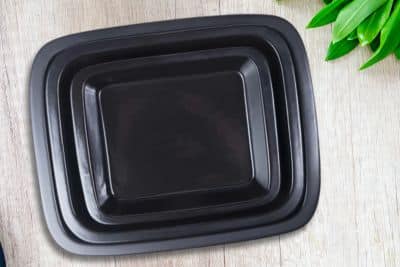
Why It's the Best Pure Ceramic Bakeware: Xtrema ceramic is triple-fired at 2,500 degrees Fahrenheit. This is the process that gives Xtrema bakeware its exceptional durability. It also resulted in excellent thermal retention and even baking during testing.
Personal Experience: I started testing with a classic lasagna (a Miller family favorite) in the 4-quart dish. The results were fantastic. The even heating ensured the lasagna was perfectly cooked, with a beautifully browned top.
Another standout feature is the naturally non-stick surface. I baked a brownie traybake in the 2-quart dish. It slid out effortlessly without leaving hardly any residue.
Cleanup was equally easy. A quick rinse with warm, soapy water and a soft sponge left all three pans spotless. I also appreciate that these pans are dishwasher-safe, a huge bonus for busy weeknights.
About the Brand: Xtrema is founded on health, safety, and sustainability principles. It makes 100% ceramic products free from metals, toxins, and harmful chemicals.
Xtrema's cookware and bakeware are handcrafted by skilled artisans in China.

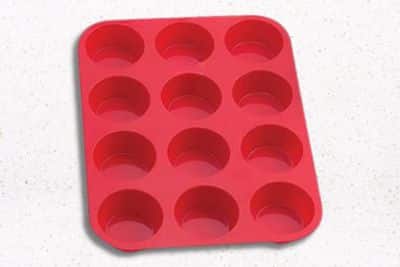
Why It's the Best Silicone Bakeware: The silicone bakeware market is full of cheap imports made from questionable materials. However, I was impressed by the quality of the oven-safe silicone used by Mrs. Anderson's Baking.
It uses 100% European-grade silicone (certified by LFGB). This type of silicone maintains its elasticity and non-stick properties. Across all my tests, it gave me the most consistent silicone baking experience.
Personal Experience: I liked how easily my muffins were released from the pan. There was no sticking, and each muffin came out perfectly shaped.
This muffin pan was significantly sturdier than many of the lesser-quality options I tested. It's strong enough to stand on its own when filled with batter. This made handling and transferring in and out of the oven easy.
I also love its versatility. I used this pan not only for baking muffins but also for making mini cheesecakes and gelatin desserts. The pan performed consistently well across all these different uses.
Cleanup was also super easy. The naturally non-stick surface means that even the stickiest batters came off quickly. I preferred to handwash it, but it's dishwasher safe if you want extra convenience.
About the Brand: Mrs. Anderson's Baking is a trusted brand under the umbrella of HIC Harold Import Co.
Founded in 1957, HIC Harold Import Co. has established itself as a leading supplier of high-quality cooking supplies.
This family-owned company has built a reputation for providing reliable kitchen tools that professional chefs and home cooks can trust.
I left no stone unturned when testing non-toxic baking brands for this article.
The process involved thoroughly evaluating several key factors. Here's a breakdown of what I looked for during the testing process.
Traditional bakeware can leach toxic chemicals into your food.
Some of the chemicals found in traditional bakeware include the following.
Teflon, a brand name for polytetrafluoroethylene (PTFE). It's a popular coating for non-stick bakeware.
However, when overheated, PTFE can release toxic fumes, causing flu-like symptoms in humans.
Also, PTFE can degrade over time and flake off off into food. This raises further concerns about long-term health effects.
Aluminum is an excellent conductor of heat and is commonly used in bakeware.
However, uncoated aluminum baking sheets pose risks when exposed to acidic foods. Aluminum bakeware can react with acids, such as those found in tomatoes or citrus fruits, leading to aluminum leaching into the food.
High levels of aluminum consumption have been linked to health issues in some people.
Bisphenol A (BPA) is a chemical found in some bakeware storage solutions.
BPA can leach from plastic bakeware into food, posing a potential health risk.
It's been associated with various health problems, including hormone disruption, reproductive issues, and increased risk of certain cancers.
Lead and cadmium are heavy metals found in some bakeware glazes. They're generally more common in old or vintage items
These toxic substances can leach into food, especially acidic or hot foods, posing severe health risks when ingested over time.
Chronic exposure to lead and cadmium has been linked to developmental delays, neurological problems, and organ damage.
There are two types of ceramic bakeware:
Glass bakeware is inert, meaning it won't react with your food.
Glass is durable and can withstand high temperatures without breaking down.
It's also transparent, allowing you to monitor your cooking progress easily.
However, glass bakeware will shatter if dropped.
Silicone bakeware is non-stick. It releases baked goods easily without needing additional grease.
It's also highly durable and can withstand high and low temperatures, making it versatile for various baking needs.
Look for food-grade silicone free of BPA, phthalates, and other harmful chemicals.
High-quality stainless steel is one of the safest bakeware materials. It doesn't leach chemicals into food and is resistant to rust and staining.
Stainless steel bakeware distributes heat evenly. It's also easy to clean and maintain.
Cast iron provides excellent heat distribution and retention.
Cast iron bakeware becomes naturally non-stick when properly seasoned, reducing the need for added fats.
It's also incredibly durable and can last for generations with proper care.
There are two types of stoneware bakeware:
Old porcelain bakeware has a reputation for being toxic. This is due to the use of lead-based glazes and colors.
However, modern porcelain bakeware is made from refined clay and fired at high temperatures. It's naturally non-toxic and does not leach chemicals into food.
Porcelain bakeware is often beautifully designed. It can double as serveware, adding elegance to your table.
Carbon steel bakeware is a durable, lightweight option that heats quickly and evenly. It's free from harmful chemicals and provides excellent baking performance.
It must be seasoned like cast iron to develop a natural, non-stick surface and prevent rusting.
Switching to non-toxic bakeware has both health and environmental benefits.
The non-toxic materials mentioned above do not leach harmful chemicals. This means your food stays pure and safe to eat.
Non-toxic bakeware is also better for the environment.
Traditional bakeware often contains synthetic materials that are not biodegradable. Non-toxic options are usually made from natural, sustainable materials.
They often last longer too, so there's no need to buy frequent replacements.
This certification ensures that the materials used in the bakeware meet safety standards set by the U.S. Food and Drug Administration.
Prop 65 is a California law that requires products to disclose any chemicals known to cause cancer or other reproductive harm.
LFGB certification is a European standard that ensures food safety.
Products with this certification have been tested for chemical safety and are free from harmful substances.
Always allow bakeware to cool before washing. Sudden temperature changes might cause cracking or warping.
Use warm, soapy water and a soft sponge to clean. Avoid abrasive cleaners and scouring pads, as they can damage the surface of your bakeware.
For stubborn residue, soak the bakeware in warm water and baking soda. This helps to lift food particles without harsh scrubbing.
Thoroughly drying your bakeware is essential to prevent moisture damage, especially for materials like cast iron.
Stack similar materials together to avoid scratches and chips. For example, place ceramic dishes with other ceramic items. Use a soft cloth or paper towel between pieces to prevent scratching.
Store all bakeware in a cool, dry place. This is especially important with iron bakeware (to prevent rust).
The best non-toxic bakeware materials can handle a range of temperatures, but it's important to know their limits. For example:
Always check the manufacturer's guidelines for specific limits. Knowing the temperature ranges for each type of bakeware can help prevent damage and ensure better cooking results.
Preventing food from sticking is a common concern. With non-toxic bakeware, a little preparation goes a long way:
The healthiest bakeware to use includes pure ceramic, glass, and high-quality stainless steel. All the recommendations in this article are healthy and non-toxic.
Yes, Caraways' excellent range of ceramic-coated bakeware is non-toxic.
I love Caraway and have previously recommended the brand for non-toxic cookware, tea kettles, cutting boards, and more.
However, I felt that Our Place's ceramic-coated bakeware was a better recommendation for this article.
Yes, Pyrex bakeware is non-toxic. Most Pyrex in the US is made from tempered soda-lime glass, which is free from harmful chemicals like BPA and lead.
The silicone bakeware pinch test is a simple method for checking the quality of silicone.
Pinch and twist a small section of the silicone bakeware. If it turns white, it may contain lower-quality fillers. If it stays the same color, it is pure, high-quality silicone.
Choosing the right non-toxic bakeware is vital for your health and the environment.
Through extensive testing and personal experience, I've identified the best options available in 2024.
Each brand offers unique benefits. From 360 Cookware's robust stainless steel (my top pick) to the versatile and eco-friendly Our Place bakeware sets.
Opting for any of the brands in this article means you can bake safely, knowing that harmful chemicals won't leach into your food.

Our core values mean we always prioritize sustainability over profit. We carefully evaluate and personally test every product to ensure they meet our high standards. All products recommended in this article were tested in accordance with our Review Methodology.
TheRoundup.org - As Seen On
